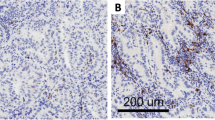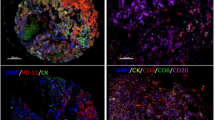Abstract
Purpose: To characterize HLA class I antigen expression in non-small cell lung cancer (NSCLC) lesions, and to assess the clinical significance of these molecules’ downregulation. Methods: One hundred and ninety primary formalin fixed, paraffin embedded NSCLC lesions were stained with HLA class I heavy chain-specific mAb HC-10. Results were scored as percentage of stained tumor cells and categorized into three groups: 0–24% (negative), 25–75% (heterogeneous) and >75% (positive). HLA class I antigen expression was correlated with clinical and pathologic predictors of time to progression and survival and analyzed using the chi-square test. Association between HLA class I antigen expression and survival was assessed using Cox regression models, while controlling for confounders. Results: HLA class I antigen expression was negative, heterogeneous and positive in 153, 25 and 12 primary NSCLC lesions, respectively. Independent variables significantly associated with survival included tumor stage, PS and weight loss. The median survival times were 40.6, 44.0 and 17.9 months for patients with a HLA class I antigen expression scored as negative, heterogeneous and positive, respectively. Conclusion: HLA class I antigen defects were found with high frequency (93.6%) in NSCLC lesions. HLA class I antigen downregulation was associated with improved survival, although this association was not statistically significant. These results, which parallel similar findings in uveal melanoma and in breast carcinoma, raise the possibility that NK cells may play a role in the control of NSCLC tumors.



Similar content being viewed by others
References
Barnstable CJ, Bodmer WF, Brown G, Galfre G, Milstein C, Williams AF, Ziegler A (1978) Production of monoclonal antibodies to group A erythrocytes, HLA and other human cell surface antigens-new tools for genetic analysis. Cell 14:9–20
Dunn GP, Old LJ, Schreiber RD (2004) The three Es of cancer immunoediting. Annu Rev Immunol 22:329–360
Garrido F, Cabrera T, Concha A, Glew S, Ruiz-Cabello F, Stern PL (1993) Natural history of HLA expression during tumour development. Immunol Today 14:491–499
Greenlee RT, Hill-Harmon MB, Murray T, Thun M (2001) Cancer statistics, 2001. CA Cancer J Clin 51:15–36
Hicklin DJ, Marincola FM, Ferrone S (1999) HLA class I antigen downregulation in human cancers: T-cell immunotherapy revives an old story. Mol Med Today 5:178–186
Jager MJ, Hurks HM, Levitskaya J, Kiessling R (2002) HLA expression in uveal melanoma: there is no rule without some exception. Hum Immunol 63:444–451
Kageshita T, Hirai S, Ono T, Hicklin DJ, Ferrone S (1999) Down-regulation of HLA class I antigen-processing molecules in malignant melanoma: association with disease progression. Am J Pathol 154:745–754
Kageshita T, Hirai S, Ono T, Ferrone S (1997) Comparison of the reactivity of frozen and formalin fixed, paraffin-embedded sections of melanoma lesions with anti-HLA class I mAb. In: Charron D (ed) Genetic diversity of HLA. Functional and medical implications. Proceedings 12th international histocompatibility workshop and conference, vol II. EDK, Sevres, France, pp 737–739
Korkolopoulou P, Kaklamanis L, Pezzella F, Harris AL, Gatter KC (1996) Loss of antigen-presenting molecules (MHC class I and TAP-1) in lung cancer. Br J Cancer 73:148–153
Lampson LA, Fisher CA, Whelan JP (1983) Striking paucity of HLA-A, B, C and beta 2-microglobulin on human neuroblastoma cell lines. J Immunol 130:2471–2478
Ljunggren HG, Karre K (1990) In search of the ‘missing self’: MHC molecules and NK cell recognition. Immunol Today 11:237–244
Madjd Zahra SI, Pinder S, Ellis IO, Durrant LG (2005) Loss of MHC class I is an independent indicator of good prognosis in breast cancer. Int J Cancer (in press)
Marincola FM, Jaffee EM, Hicklin DJ, Ferrone S (2000) Escape of human solid tumors from T-cell recognition: molecular mechanisms and functional significance. Adv Immunol 74:181–273
Menon AG, Morreau H, Tollenaar RA, Alphenaar E, Van Puijenbroek M, Putter H, Janssen-Van Rhijn CM, Van De Velde CJ, Fleuren GJ, Kuppen PJ (2002) Down-regulation of HLA-A expression correlates with a better prognosis in colorectal cancer patients. Lab Invest 82:1725–1733
Mountain CF (1997) Revisions in the international system for staging lung cancer. Chest 111:1710–1717
Parmiani G, Castelli C, Dalerba P, Mortarini R, Rivoltini L, Marincola FM, Anichini A (2002) Cancer immunotherapy with peptide-based vaccines: what have we achieved? Where are we going? J Natl Cancer Inst 94:805–818
Pass HI MJ, Johnson DH, Turisi AT, Minna JD (2000) Lung cancer: principles and practice. Lippincott, Williams and Wilkins, Philadelphia
Perosa F, Luccarelli G, Prete M, Favoino E, Ferrone S, Dammacco F (2003) Beta 2-microglobulin-free HLA class I heavy chain epitope mimicry by monoclonal antibody HC-10-specific peptide. J Immunol 171:1918–1926
Redondo M, Ruiz-Cabello F, Concha A, Cabrera T, Perez-Ayala M, Oliva MR, Garrido F (1991) Altered HLA class I expression in non-small cell lung cancer is independent of c-myc activation. Cancer Res 51:2463–2468
Restifo NP, Esquivel F, Kawakami Y, Yewdell JW, Mule JJ, Rosenberg SA, Bennink JR (1993) Identification of human cancers deficient in antigen processing. J Exp Med 177:265–272
Stam NJ, Spits H, Ploegh HL (1986) Monoclonal antibodies raised against denatured HLA-B locus heavy chains permit biochemical characterization of certain HLA-C locus products. J Immunol 137:2299–2306
Stutman O (1979) Chemical carcinogenesis in nude mice: comparison between nude mice from homozygous matings and heterozygous matings and effect of age and carcinogen dose. J Natl Cancer Inst 62:353–358
Stutman O (1974) Tumor development after 3-methylcholanthrene in immunologically deficient athymic-nude mice. Science 183:534–536
Temponi M, Kekish U, Hamby CV, Nielsen H, Marboe CC, Ferrone S (1993) Characterization of anti-HLA class II monoclonal antibody LGII-612.14 reacting with formalin fixed tissues. J Immunol Methods 161:239–256
Travis WD, Travis LB, Devesa SS (1995) Lung cancer. Cancer 75:191–202
Acknowledgements
We thank Joan Beck for her assistance in the preparation and processing of tumor procurement and Debbie Malik for her expert assistance in histology
Author information
Authors and Affiliations
Corresponding author
Additional information
N. Ramnath and D. Tan contributed equally to the paper
Rights and permissions
About this article
Cite this article
Ramnath, N., Tan, D., Li, Q. et al. Is downregulation of MHC class I antigen expression in human non-small cell lung cancer associated with prolonged survival?. Cancer Immunol Immunother 55, 891–899 (2006). https://doi.org/10.1007/s00262-005-0085-7
Received:
Accepted:
Published:
Issue Date:
DOI: https://doi.org/10.1007/s00262-005-0085-7




